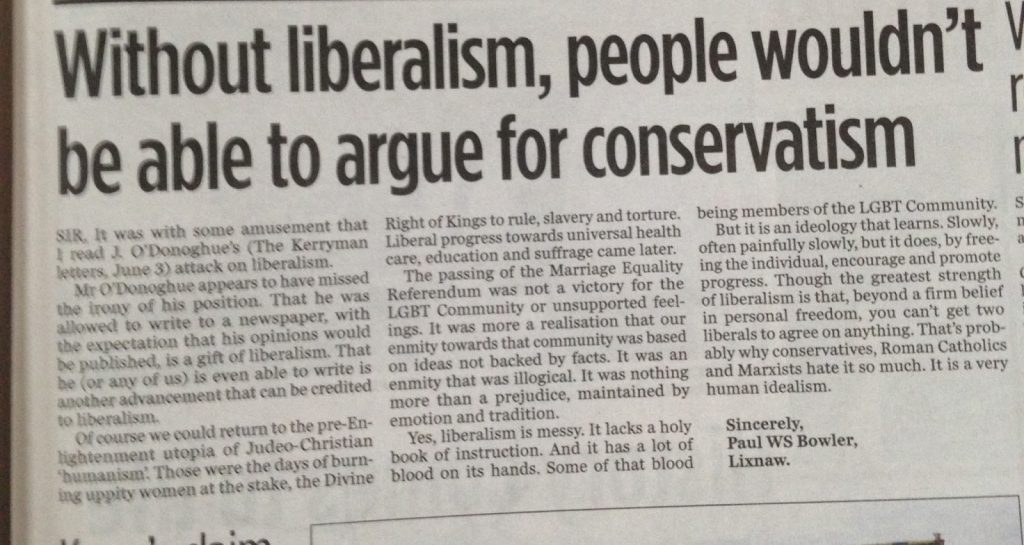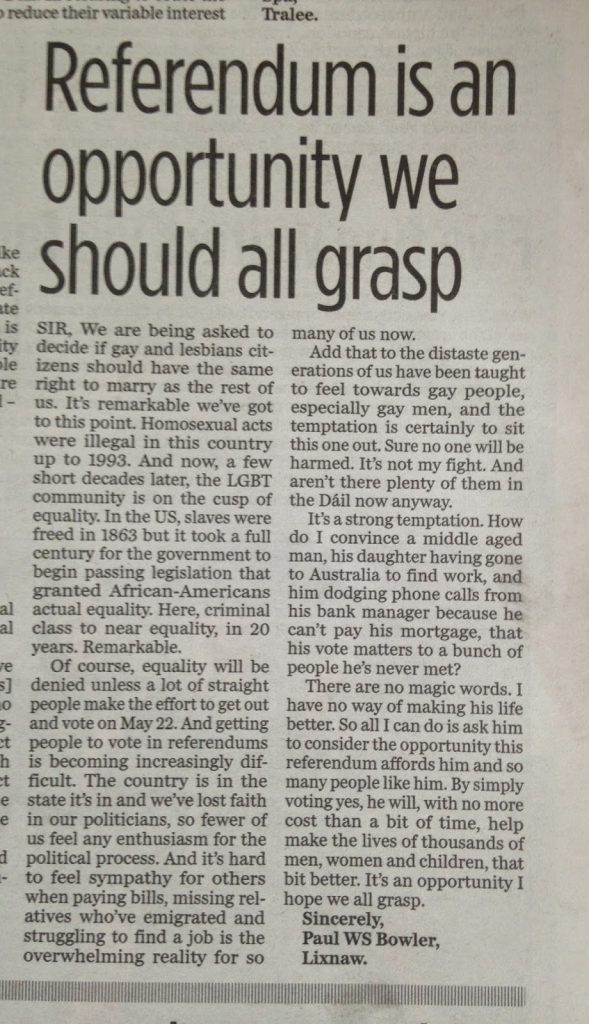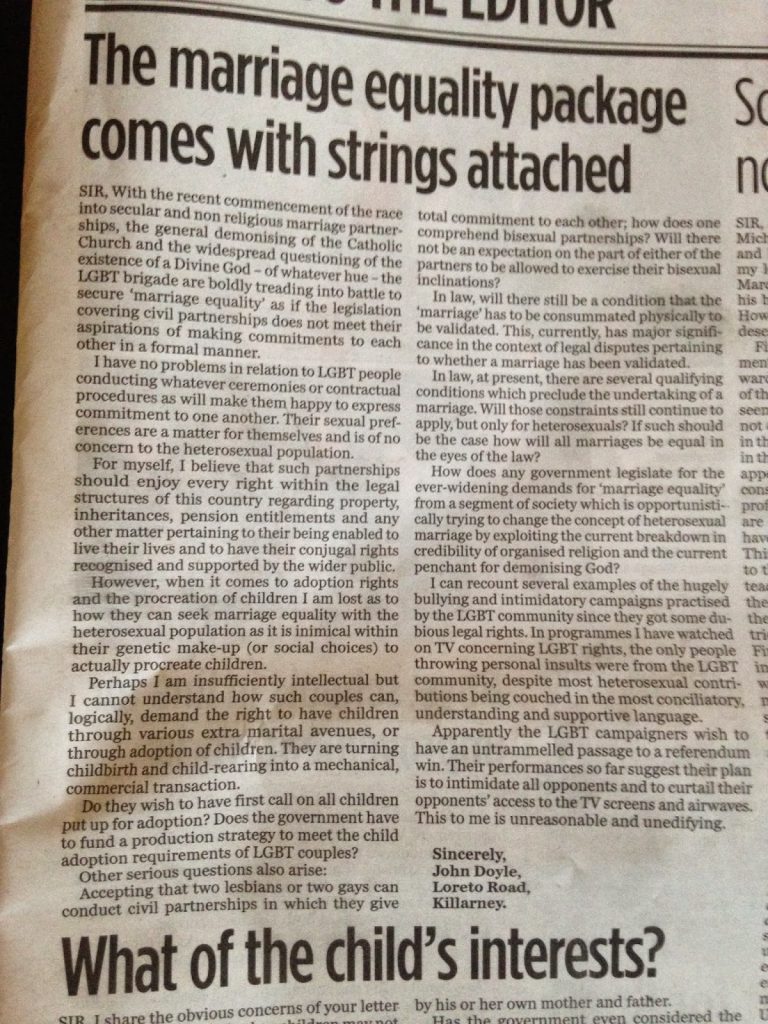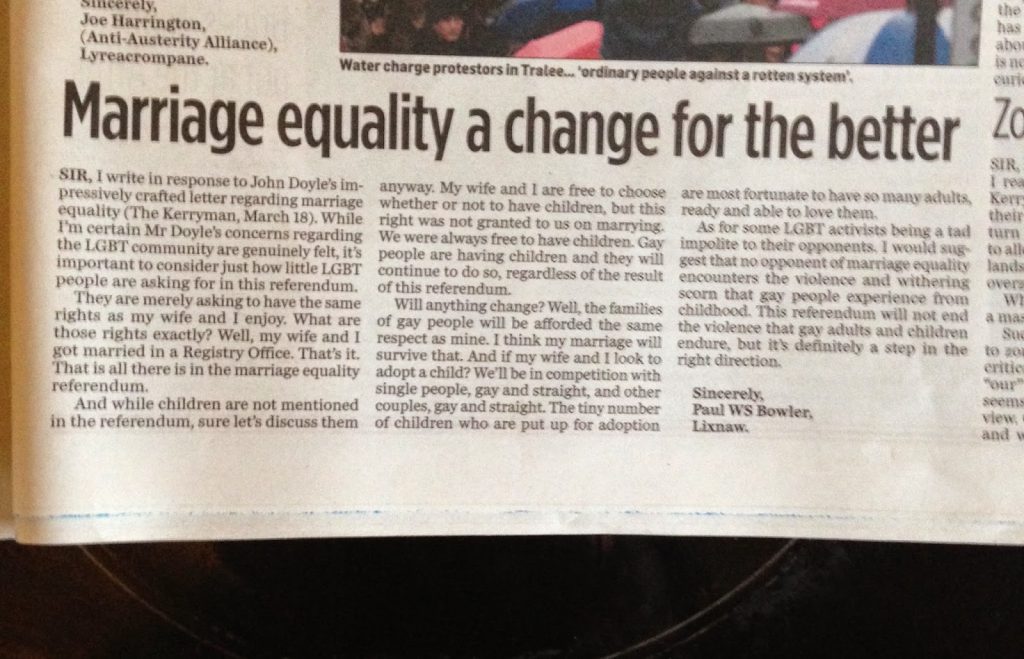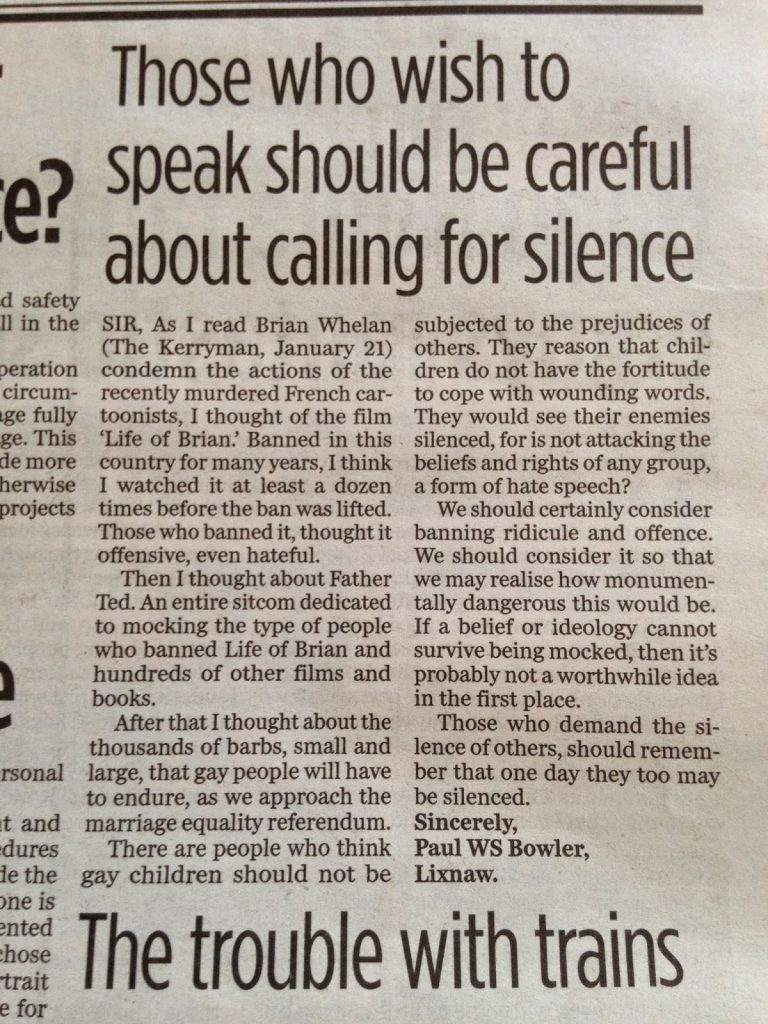Gandalf knows I’ve little interest in competitive 1916ing. I would avoid the sport altogether, except it does provide an opportunity for a little thought experiment. Imagine a class of 35 teenagers is asked to write a short essay about what it means to them, to be Irish. That is 35 individual perspectives on Irish identity.
Now before you read the essays, ask yourself the following questions; if you disagree with an opinion, does that mean the teenager is wrong? How much uniformity do you hope to see in the essays? Will the essays be much different to what would’ve been written ten years or fifty years ago? If different, is this a good or a bad thing? Will you value the opinions of the new Irish as much as the old Irish? Do you think you’ll be able to detect differences based on gender, income, sexuality, race and religion? Do you think this class of teenagers would write the same thing in ten or fifty years from now?
What I’d hope this experiment would successfully demonstrate, is the fluidity of Irish identity. I would also like to think (and I’m open to contradiction here) is that there is now greater variation in today’s multitude of Irish identities than there has ever been since the foundation of the State.
I happen to think that’s a positive development. I remember when I was in school, we were taught that one of the causes of The Great Famine was monoculture i.e. an over reliance on one crop. I can’t help thinking that the dreary sameness of Irish culture up to quite recently, had a part in producing a State seemingly incapable of dealing with crises or indeed difference.
That’s possibly why I react so negatively to 1916ing. I keep hearing so many different people insisting that their 1916 is the most authentic and that all you other 1916s are revisionist, reactionary, counter revolutionary, and not the right sort of patriot. And if you even question the motives of the 1916ers themselves, well then you’re clearly a West Brit hankering for a return of the Irish Raj.
It is as if demonstrations of physical bravery sanctify actions however misguided. This deathly piety, infects and animates both left and right with equal vigour. Will those who died in the crossfire of this ‘idealism’ be remembered? Will those who were maimed in a cause they did not support be afforded equal respect? Of course not. All that matters is that we wave the flag and insist 1916 means such and such a thing.
What the fuck, you may be asking, has this got to do with secularism? Well let me explain. Traditionally, when an Irish atheist speaks about secularism, we tend to simply attack the Roman Catholic Church. It’s almost a reflex at this point. Any and all demonstrations of Catholicism provokes us. We use terms like ‘sky wizard’ and ‘flat earthers’ and ‘Bronze Age inspired homophobes’ (ok I just made that last one up, but you get the picture).
Has this ever proven useful? I fear it hasn’t. It inspires a defensiveness we’ve never really been able to overcome. And when we resort to seemingly neutral terms like ‘rights’ ‘equality’ ‘pluralism’ and the ‘UN’ we very much meet the same reaction; this is a Catholic country and if you were in Saudi Arabia you’d know your place.
This failure, no our failure, was brought home to me by a recent incident in my own county of Kerry.
A cross at the top of Kerry’s Mount Carrauntoohil, was vandalised, cut down by someone who climbed the mountain with an angle grinder. Now my first reaction was, there’s a cross at the top of Carrauntoohil? Followed by a shudder, then the thought, is there any where in this country free from these Catholic symbols?
Then something unpleasant occurred to me. What if this was one of our lot? And I use ‘our lot’ in the broadest sense, meaning anyone who might have been motivated by secularism, atheism or anything similar. I prayed to the gods I don’t think exist, that this would prove to be a work of pure vandalism or even perhaps a rather energetic environmentalist. Gandalf knows we could do with more environmentalists in Kerry.
I’m ashamed to admit, that I even momentarily hoped it was of one the many victims of the Irish Catholic Church, exacting some revenge. An unworthy thought. Being president is just not that important.
Soon after this, representatives of Atheist Ireland were interviewed on local and national radio stations. As a member for that organisation I was hoping they’d see the danger and opportunity this incident represented. I was sadly and emphatically disappointed.
No sympathy for the communities, who’d erected the cross, was offered. And worse, its restoration was questioned. I was appalled, still am. I engaged with Michael Nugent on Twitter, but I failed to make him realise how badly Atheist Ireland’s response reflected on us all. Worse, it now makes the removal of the crucifix in the Kerry County Council Chambers even less likely. The only response from Atheist Ireland should’ve been, ‘this is terrible and how may we help?’
The cross was put back up, in an almost secret operation, such were the fears of the local communities. Think on that. What hope does a secularist now have in engaging fruitfully with those people? They are actually scared of an organisation with next to no influence and even less power.
(As it happens, the vandal did turn out to have a gripe with the Catholic Church)
I let my membership of Atheist Ireland lapse. Its clueless and tone deaf behaviour shocked me too much to have anything else to do with it.
Thing is though, I still support its stated aims of promoting atheism, reason and an ethical, secular state.
I don’t actually wish to spread atheism, but I want everyone to be as familiar with it as they are the various Christian sects, Islamic traditions, Eastern philosophies, weird American cults, astrology and paganism. Which is to say, I’d like Irish people to be as equally ignorant of the several tensions that exist as atheism, as they are the about the divisions, contradictions and rivalries that exist within all the other groups. I want this for one reason and one reason only, so that we can make some progress in creating a truly secular state.
Why? Why this need for secularism? And where does having a go at the current fashion for 1916ing come into it? Be patient, I’m getting there.
Secularism is derided by both left and right as being innately conservative and far too radical. If the Marxists and reactionaries hate you, then you’re probably doing something right. The thing is, both are entirely correct.
Yes the cause of secularism is profoundly conservative. Look at us. We are almost exclusively white men, living comfortable lives. I am not fit to wash the feet of a secularist living in Saudi Arabia. I’d blush in the presence of a Russian secularist. And I’d be tongue tied if I met a woman secularist. In Catholic Ireland I must labour under the yoke of not being allowed be President, a judge or a member of The Council of State. Imagine my rallying call; come all, join me in my fight to have the theoretical right to a pointless, but well paid, office. Help, help, I’m being repressed.
And yet, the cause of secularism is profoundly radical. For there can be nothing sacred in a secular state. Not the right to have one’s opinions respected. Not the right to cut a small child’s genitals. Not the right to impose one’s beliefs. And never a right to state sanctioned privilege.
Those of us who identify as non-religious are a disparate lot. That which is the non-religious part of our identities, contributes to our Irish identities. To some, this is a defining feature, for others, it is but a tiny aspect of the over all. But we are about 250,000 of the population. That’s a big chunk of people.
On the other hand (as opposed to other side) there are the ‘still’ millions who identify as Roman Catholic. This group is as disparate as the many contradictions found among the non-religious. And again, in varying degrees, these multitudinous identities, influence their Irish identities.
That these identities are privileged is inarguable. That they represent the vast majority of identities, is without question. And that they have the weight of tradition and history behind them, is clear to all.
They are as entitled to the respect as this ‘militant’ atheist wishes he was afforded. But for secularism to succeed they will need to change, they will need to cede some of their power, they will need to accept uncomfortably new modes of behaviour. Their perception of Irish identity will need to broaden, in some cases, considerably.
But if they ask why they should change? Why should they give up anything? Why can’t things just stay the same?
Do I answer with, your God is a sham, I want to be president (in theory), the UN said so, in fact comparing ourselves to Saudi Arabia demonstrates such low national self-esteem you should probably seek help or because you’re just being mean not giving me my own way?
Thing is, there is no right answer. There is no silver bullet for convincing someone that the way things have been done for a century is discriminatory and worse, self defeating. Convincing someone of something, who doesn’t want to be convinced, is an exercise is such futility that one must grope for Greek legends for an appropriate metaphor.
And when that attempt is made with clumsy insensitivity, then that rock gets heavier and the hill steeper.
But is this a call for surrender? No. Far from it. Nor am I suggesting, hinting or even hoping that secularism is in anyway a natural progression and we need merely sit back and watch it grow.
Even in this time of competitive 1916ing and all the atavist nonsense that it entails, it is clear that Ireland has changed and is continuing to change. While people will (in these few nostalgic riven years) speak about the Irish character and Irish identity, the days of everyone following the flag, step in step (if indeed that ever existed) is long gone.
There is now, no Irish identity. And if anyone tells you there is, they probably trying to sell you something. There are many identities, many cultures, many ways at looking at the world and now, several opportunities for minorities to assert their claim to equal treatment and esteem.
And yes, that implies I am putting the non-religious into the category of oppressed minority. And yes, I am. But quell your ire, for this is the key point I am struggling to make in this overly long post. There is a queue of minorities, all standing and waiting or marching and demanding equality. All looking for their threads in the tapestry of Irishness to be recognised. The non-religious absolutely belong in that queue, but near the back. And while standing and waiting (occasionally raising our hands to remind people we are here) our main focus should be in supporting those people ahead of us is the queue. Because if and when we’re the only ones left, we won’t even have to ask anymore.
